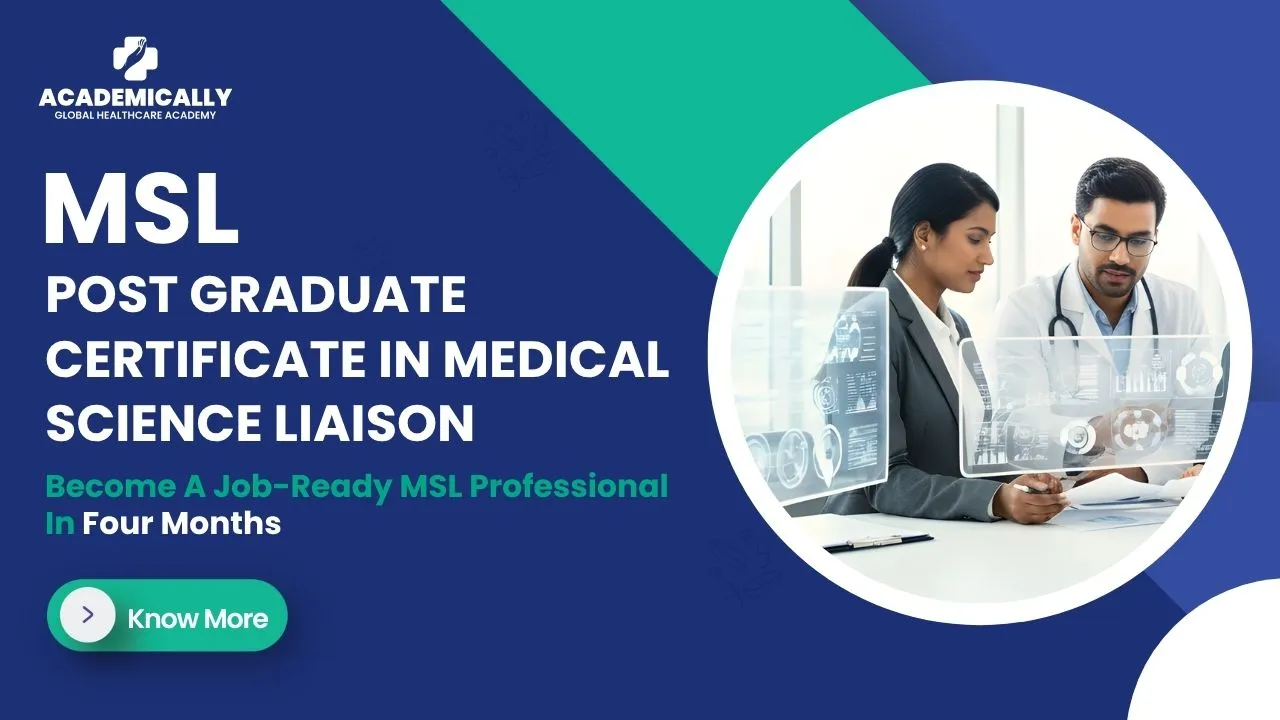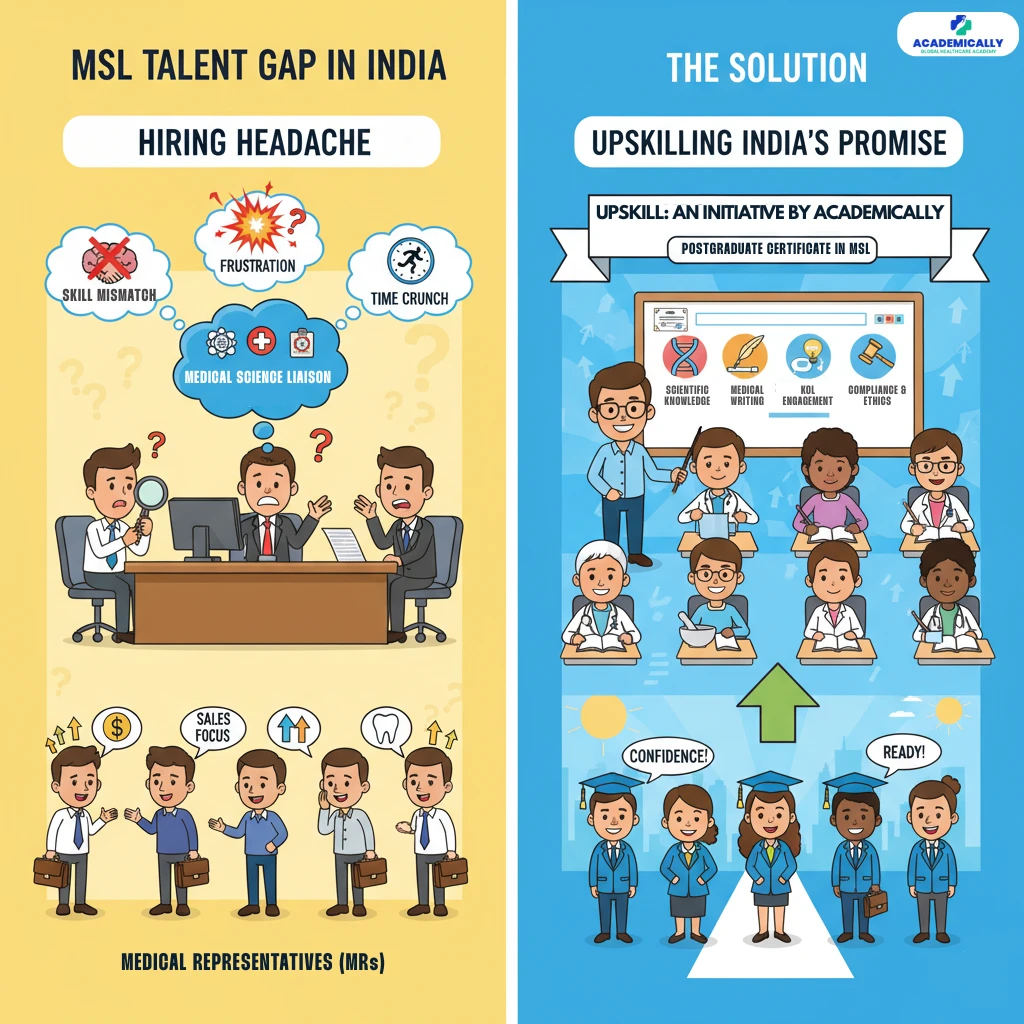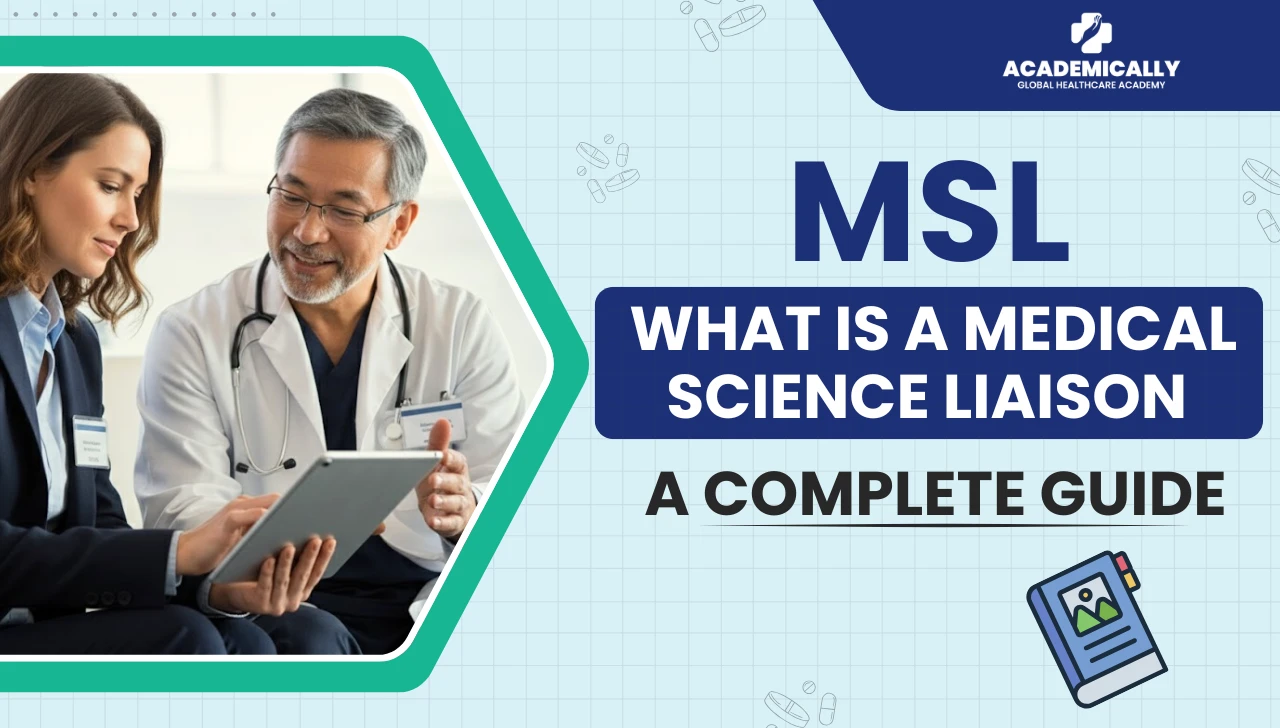Did you know… you can earn up to ₹14 lakhs as a Medical Science Liaison right in your home country? Yes, you heard it right. When I first heard about the role of a Medical Science Liaison (MSL), I had no idea it could be this distinct from the usual pharmacy/clinical/teaching career pathways. For many graduates in medicine, pharmacy, life sciences, and dentistry in India (and abroad), options often feel limited to hospital roles, preparing for competitive exams (NEET-PG, FMGE, AMC, USMLE), or traditional research careers.
But as Dr. A.P.J. Abdul Kalam wisely said,
“Excellence happens not by accident. It is a process.”
My journey of exploring career pathways beyond traditional routes led me to discover the MSL profession. It is a career that beautifully merges science, communication, and purpose.
Over time, I discovered the MSL role is one of the fastest-growing, deeply respected, high-potential and well-compensated career paths in the pharmaceutical, biotech, and healthcare sectors. In this blog, I’ll share everything I’ve learned, from origins and global importance to what the job actually involves, how it differs from sales roles, what skills are required, and how to prepare for it. This is based not only on public sources but also on personal interactions with students and professionals who are in or considering this field.
How MSL came into existence: This isn’t your boring history lesson
MSL happened in the late 1960s in the USA. This is the era when pharmaceutical companies realised they needed scientifically trained staff. They should be able to explain the science behind medicines, clinical trial data, safety profiles, etc., instead of pushing for prescriptions.
Drug development became more complex with the rise of biologics, oncology, precision medicine, gene therapy, and vaccines. Hence, the need for scientific specialists in the field who can engage in unbiased scientific dialogue grew.
In this era, almost all major pharmaceutical and biotech companies (Pfizer, Novartis, Roche, AstraZeneca, Sanofi, J&J, etc.) employ MSLs in many geographies. The role has expanded beyond just “giving information” to also generating real-world evidence, supporting investigator-initiated trials, helping in medical strategy, etc.
Is MSL globally recognised?
Why are MSLs critical today? Here’s why:
- Data-driven medicine: Healthcare professionals rely on clinical data, outcomes, treatment guidelines, comparative studies, and real-world evidence. They are looking for scientific conversations, not marketing-based pitches.
- Regulatory & Ethical Expectation: Regulation around drug promotion is getting stricter. Many jurisdictions demand that interactions with healthcare providers be non-promotional, transparent, and evidence-based. MSLs help ensure compliance.
- KOL/Thought Leader Engagement: MSLs are the first POC for leading clinicians, researchers and opinion leaders. This helps enterprises gather insights on gaps, treatment patterns and the competitive landscape.
- Making Stakeholders Aware: MSLs often interact with hospital systems, payers, regulators, patient-advocacy groups and medical associations. Their role includes education, medical education events, advisory boards, etc.
- Supporting Clinical Trials & Evidence Generation: Investigator-initiated studies (IIS), clinical trials, and real-world evidence (RWE) studies. MSLs often help identify centres, KOLs, support protocol design, site education etc.

Why Companies Need MSLs
From the perspective of pharmaceutical, biotech, and medical device firms, MSLs offer multiple strategic advantages:
| Contribution | Description |
| Scientific Credibility | MSLs with relevant scientific or medical training (MD, PharmD, PhD, etc.) are credible peers. Doctors/researchers heavily rely on them to get the right scientific information on antibiotics. |
| Medical Insights & Feedback | They gather field insights. This includes physicians’ observations, patients’ requirements, side effects or any kind of challenges that exist. It helps companies adjust strategy, R&D and safety monitoring. |
| Support for Launches & Life Cycle Management | For a new drug or therapy, MSLs help in disseminating data, educating stakeholders, preparing for product launch, and creating medical education plans. Also helpful in later stages (post-launch) for safety, new indications, etc. |
| Regulatory Support & Compliance | MSLs help ensure that information shared is compliant with laws, guidelines, and medical governance. They have a non-promotional way of approaching. |
| Training Internal Stakeholders | They often train sales, marketing, and medical teams on the science, so internal messaging is accurate and consistent. |
| Bridging Commercial & Medical Strategy | Though they don’t drive sales directly, their insights and activities influence how a company positions its products, prioritises pipeline, addresses payers, etc. |

Job Responsibilities of an MSL
What I’ve found from the job descriptions from various big giants of the industry is what the JD of an MSL looks like.
- KOL Engagement
- Identifying and prioritising experts, institutions, and clinicians in specific therapeutic areas.
- Scheduling meetings, educational sessions, or advisory boards. Building long-term peer relationships.
- Scientific & Medical Communication
- Preparing and delivering presentations (conferences, workshops).
- Translating complex clinical trial data into understandable formats.
- Clinical Trials & Evidence Generation
- Engaging in investigator-initiated studies, identifying sites and KOLs.
- Supporting real-world evidence studies.
- Assisting in protocol development, site education if needed.
- Field Insights & Feedback
- Gathering medical observations from experts,
- Patients’ requirements and response to medicines
- Competitors analysis
- Feeding credible information to R&D, marketing, regulatory or market access teams.
- Medical Education & Events
Participating in advisory boards, convocations and continuing medical programmes (CME/CPD).
- Scientific Expertise & Ongoing Learning
Keeping up to date with:
- Latest literature
- Up-to-date treatment guidelines
- Safety data
- New research
- Competitor products.
- Understanding health systems and regulatory frameworks.
- Compliance & Ethics
- Ensure all scientific communications are non-promotional (unless allowed under specific regulation)
- Follow internal SOPs, external regulatory guidelines and medical governance policies.
- Travel & Fieldwork
- Visiting hospitals
- Attending meetings
- Travel to scientific conferences, depending on geography, could be frequent.
Key Differences of MSL vs Sales Representative
| Feature | Sales Representative | Medical Science Liaison (MSL) |
| Primary Goal | Drive prescriptions, meet sales targets | Share scientific, clinical evidence; educate, build credibility |
| Background/Training | Often business/marketing or general pharma sales; sometimes healthcare background, but less rigorous scientific training | Advanced degrees (MD, PharmD, PhD), strong understanding of medical/scientific research |
| Scope of Work | Product promotion, commercialisation, and marketing campaigns | Unbiased scientific exchange, medical education, responding to scientific queries, and supporting clinical strategy |
| Engagement with HCPs | Frequent, sometimes promotional; focus on influencing prescribing behaviour | Peer-to-peer, scientific discussions; non-promotional; often with specialists & KOLs |
| Metrics of Success | Sales numbers, market share | Quality of scientific exchange, insight generation, education impact, compliance, and relationship strength |
| Compliance Risk | Promotional activities are closely regulated; risk if overstepped boundaries | Must strictly adhere to regulatory, ethical guidelines; often more oversight in communications and materials |
My Perspective & Final Thoughts
In my experience guiding students and professionals towards medical affairs / MSL roles, I’ve seen how rewarding this path can be, both intellectually and professionally. Some closing reflections:
- Impact on Patient Care: You are contributing indirectly to improving patient outcomes, whether by ensuring doctors have the latest evidence, helping clinics or hospitals adopt better practices, supporting trials, etc.
- Respect & Credibility: You're operating in scientific areas, and you're respected by clinicians and researchers. It’s more than sales numbers; it's about scientific integrity.
- Global Scope: MSL roles can take you across geographies, working in global medical affairs teams. The skills are transferable internationally.
- Growth & Stability: With increasing complexity of medicines and treatments, medical affairs (including MSLs) is not likely to dip; if anything, demand will increase.
If you are a healthcare/life-sciences graduate (medicine, pharmacy, biology, etc.), enjoy scientific work and communication, and are okay with field work, then MSL could be a fantastic path. With the right training, strategic focus, and continuous learning, it can open up a stable, well-remunerated and highly respected global career.




